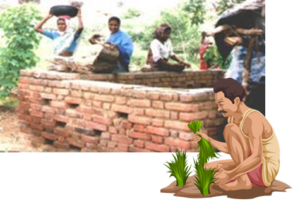 Use of local and natural resources is a key to organic farming. It includes locally available seeds; materials and methods for nutrient, pest and biodiversity management.
Use of local and natural resources is a key to organic farming. It includes locally available seeds; materials and methods for nutrient, pest and biodiversity management.
Extension: CSV has developed and transferred number of methods of organic farming and it includes following technologies
Different Methods of Manure Making NADEP; Vermi Compost; Biodynamic Preparations; Bio Fertilizers; Liquid organic Manure etc.
Production of Crop using Manure
Bio-diversified Cropping Pattern
Use of Herbal Pest repellnts
Use of Secondary Metabolite Rich Plants as Insect Repellant, Anti Feedent, Oviposition Deterrent
Use of Biological Agents
Emitter Irrigation —
It makes use of suction force present in dry soil. The system uses about 10 times less water than the flood irrigation. emitter-1emitter-6 Tuber-26
CSV has a group of 1,500 farmers doing organic farming in their farms. Under “PGS India”, CSV is recognised as certifying agency in organic farming.
Biodiversity: India has rich biodiversity (mammals 7.6%; Birds 12.6%; amphibians 4.4%; reptiles 6.2%; fishes 11.7% and flowering plants 6%) and out of 34 biodiversity hot spots it has 2 hot spots are completely embedded in its boundaries (Western Ghats and The Eastern Himalayas) while 3rd hot spot (Indo Burma) lies partially in India and partially in Burma.
Monoculture farming is very risky for the farming community. In this system if a crop grown on the field fails because of one or other reason a farmer looses all his investment.
To make farming practices more resilient to environmental perturbations CSV promotes multi tiered farming. This goal is being achieved by introducing more than 100 lesser known plant species as agriculture crops in phased manner. Some of the representative species are listed below.
Herbs: Ambadi or Hibiscus subdariffa; Tarota or Cassia tora
Shrubs:
Small trees: Sinduri or Bixa orellana; Charoli or Buchnania lanzan; Bhokar or Cordia rothii; Salai or Boswella serrata etc.
Big trees: Mahua – Madhuca indica; Palms – Phoenix sylvestris
Twines: Phand or Midnapur Creeper – Revia hypocretariformis; Shatawari or Asparagus racemosus; Phot or Snap Mellon or Cucumis momordica etc.
Lianas: Ragatpuda – Ventilago denticulate
